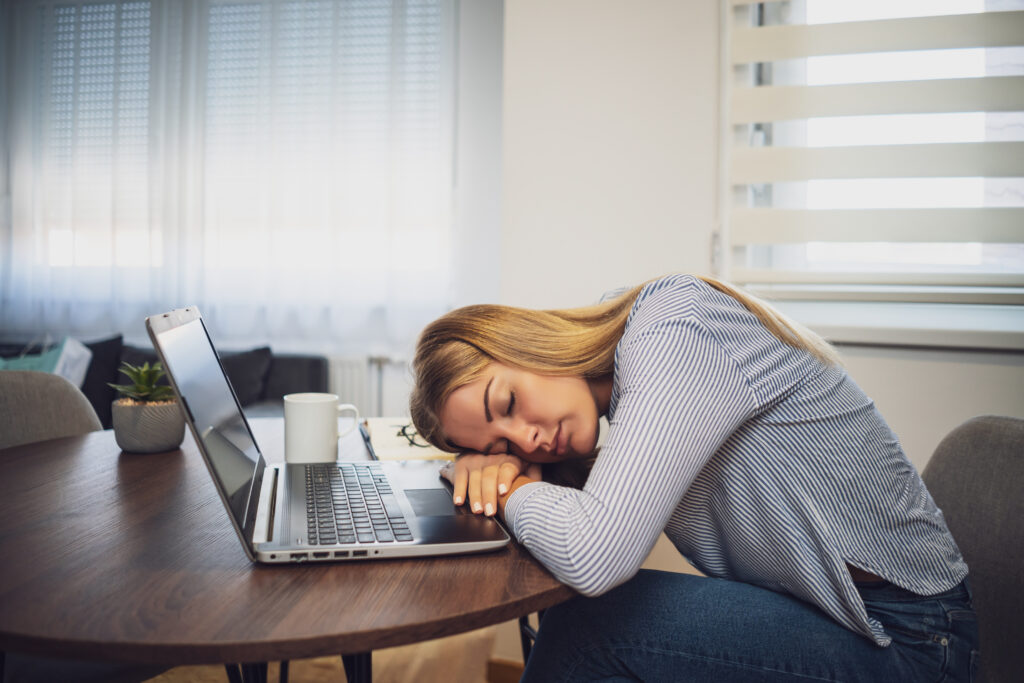Sleep Better, Work Better: A Guide to Boosting Productivity through Restful Nights
Are you struggling to stay productive during the day, no matter how hard you try? Chances are, your lack of productivity could be related to the quality of your sleep. That’s right–getting enough restful nights of sleep can play an important role in boosting your productivity and overall performance.
In this blog post, we’ll discuss how to make sure you’re getting the most out of your restful nights in order to help you work better. Keep reading…
The Importance of Sleep for Productivity

We’ve all had those days where we wake up feeling groggy, lethargic, and completely unproductive.
While it may be tempting to attribute these feelings to a lack of caffeine or a heavy workload, the real culprit may be poor sleep quality. In fact, studies have consistently shown that sleep is essential for cognitive function, concentration, and overall productivity.
One of the primary ways in which sleep affects productivity is through its impact on memory consolidation. During sleep, our brains sort and consolidate information from the day, which can enhance our ability to retain and recall information. Additionally, sleep deprivation has been shown to impair attention, decision-making, and reaction times, all of which can significantly reduce productivity levels.
But the importance of sleep for productivity goes beyond just cognitive function. Poor sleep has been linked to an increased risk of health issues like obesity, diabetes, and heart disease, which can also impact our ability to work at optimal levels. In short, getting enough high-quality sleep isn’t just a matter of feeling well-rested; it’s a crucial component of maintaining our overall health and wellbeing.
So, if you’re looking to improve your productivity levels, it’s essential to prioritize your sleep habits. By doing so, you’ll not only reap the benefits of improved cognitive function and focus but also reduce your risk of numerous health problems.
In the next section, we’ll explore some of the key factors that affect sleep quality and discuss strategies for optimizing your sleep habits.
Factors Affecting Sleep Quality

Many factors can affect the quality of our sleep, from environmental factors to lifestyle choices and habits.
Some of the most common factors that can disrupt sleep include:
- Caffeine. Consuming caffeine, particularly late in the day, can make it difficult to fall asleep or stay asleep throughout the night.
- Stress and Anxiety. High levels of stress or anxiety can cause the body to produce cortisol, a hormone that can interfere with sleep.
- Alcohol. Although alcohol can make you feel sleepy, it can also disrupt sleep by causing frequent awakenings throughout the night.
- Screen Time. The blue light emitted by electronic devices like smartphones and laptops can interfere with the body’s production of melatonin, a hormone that regulates sleep.
- Noise. Noise from traffic, neighbors, or other sources can make it difficult to fall asleep or stay asleep.
- Temperature. Extreme temperatures, either too hot or too cold, can make it difficult to fall asleep or stay asleep.
Understanding the factors that can affect your sleep quality is an important step in improving your sleep habits and optimizing your productivity. By identifying the factors that may be disrupting your sleep and making changes to your routine, you can set yourself up for more restful nights and energized days.
Tips for Better Sleep Hygiene

Establishing good sleep hygiene is one of the most effective ways to optimize sleep for productivity.
Here are some tips to help you create healthy sleep habits and improve the quality of your rest:
- Stick to a sleep schedule. Try to go to bed and wake up at the same time every day, even on weekends. This helps regulate your body’s internal clock and improve sleep quality.
- Create a relaxing bedtime routine. Wind down before bedtime with a relaxing routine that helps you destress and unwind. This can include reading a book, taking a warm bath, or listening to calming music.
- Avoid electronics before bed. The blue light emitted by electronic devices can interfere with the production of sleep hormones, making it harder to fall asleep. Turn off your phone, tablet, and computer at least an hour before bedtime.
- Avoid caffeine and alcohol. Both caffeine and alcohol can disrupt sleep, so try to avoid them in the hours leading up to bedtime.
- Exercise regularly. Regular exercise has been shown to improve sleep quality and duration. Just make sure to avoid vigorous exercise close to bedtime, as it can interfere with your ability to fall asleep.
- Make your bedroom a sleep haven. Keep your bedroom cool, dark, and quiet to promote a restful environment. Invest in comfortable bedding, and remove any distractions, like TVs or laptops, that could interfere with sleep.
By following these tips for better sleep hygiene, you’ll be on your way to getting the restful nights you need to power through your days with productivity and focus.
Sleep Aids and Supplements

If you’re struggling to fall asleep or stay asleep, there are various sleep aids and supplements that can help. While it’s important to prioritize improving your sleep hygiene first, supplements can offer a natural and effective way to enhance the quality of your rest.
One popular sleep supplement is melatonin, which is a hormone that helps regulate the body’s sleep-wake cycle. Taking melatonin before bedtime can help promote sleepiness and improve the overall quality of your sleep.
Another natural sleep aid is magnesium, which is known to promote relaxation and reduce stress levels. This mineral can be taken in supplement form or found in foods such as spinach, almonds, and black beans.
Valerian root is another herbal supplement that has been shown to help improve sleep quality. It works by increasing levels of GABA, a neurotransmitter that promotes relaxation and reduces anxiety.
CBD, a compound found in cannabis plants, has also gained popularity as a sleep aid. It can help reduce anxiety and pain, which can contribute to a more restful sleep.
It’s important to note that while sleep aids and supplements can be helpful, they should be used in moderation and under the guidance of a healthcare professional. It’s also important to avoid relying on these supplements as a long-term solution and instead focus on improving your sleep hygiene and creating a consistent sleep routine.
Napping for Productivity

Napping may seem counterintuitive when it comes to boosting productivity, but research has shown that short, strategic naps can actually help you get more done in less time.
A nap can help restore energy and mental clarity, improving your focus and ability to concentrate on tasks. The ideal nap length for productivity is typically between 20 and 30 minutes, as this allows you to rest without falling into a deep sleep and feeling groggy upon waking.
It’s important to note that napping should not be a substitute for getting enough sleep at night. Naps should be seen as a supplement to your sleep routine and used strategically when you feel a dip in energy or mental focus.
To get the most out of your nap, try to find a quiet, dark place where you won’t be disturbed. Avoid consuming caffeine or heavy meals before your nap, as this can interfere with your ability to fall asleep.
Some companies are even starting to embrace the power of napping, offering employees nap rooms or designated areas for napping during the workday. If this isn’t an option for you, consider taking a nap during your lunch break or finding a quiet spot in your office or home to rest.
Overall, incorporating strategic naps into your routine can help boost productivity and mental clarity. Give it a try and see how it works for you!
Creating the Perfect Sleep Environment

Once you’ve taken steps to optimize your sleep hygiene and have considered using sleep aids and supplements, it’s time to focus on the physical environment you’re sleeping in. Creating the perfect sleep environment can go a long way in improving the quality of your sleep and ultimately, your productivity.
Here are some key elements to consider:
- Temperature. Your bedroom should be cool, between 60-67 degrees Fahrenheit. This temperature range is considered ideal for most people to promote deep, restful sleep.
- Lighting. It’s important to create a dark environment for sleeping. Invest in some blackout curtains, or use an eye mask to block out light from street lamps, alarm clocks or other electronics.
- Noise. Some people need absolute silence to fall asleep, while others prefer white noise. Experiment with different options such as earplugs or a white noise machine to find what works for you.
- Comfort. Your bed, pillows and bedding should all be comfortable and conducive to sleep. Invest in a quality mattress that provides adequate support and is suitable to your sleeping preferences. Replace pillows and bedding as needed to ensure you’re getting the best rest possible.
- De-clutter. A messy room can make it difficult to relax and fall asleep. Keep your bedroom tidy and organized to create a calm environment that promotes restful sleep.
By making small adjustments to your sleep environment, you can significantly improve the quality of your sleep and in turn, boost your productivity. Take some time to create the perfect sleep environment that works for you, and watch the benefits roll in.
Ready to sell your property? Give us a call today and learn more about our professional photography services and marketing that can boost your property listing!
Plus, explore our virtual assistant coaching program to level up your business. Don’t forget to tune into our new podcast for even more valuable insights!
